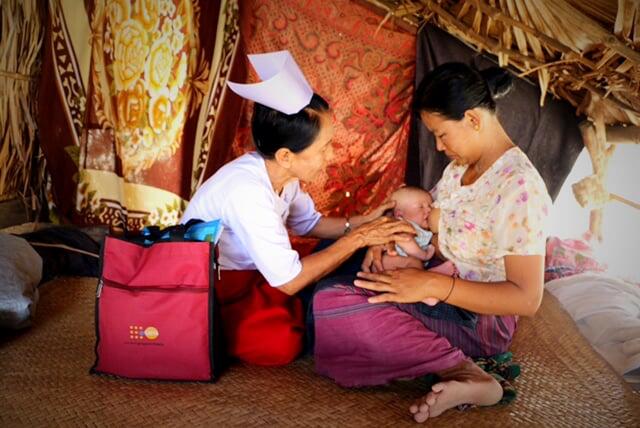Yangon - In Myanmar’s Magway region, far too many mothers, babies and infants die needlessly.
The remote Central Western district has the highest infant mortality rate in the country, and one of the highest maternal mortality rates in a nation where nearly one third more mothers die through childbirth than the South East Asian average.
Midwife Daw Aye Myint arrived in Magway in September 2015, determined to do something about it. She now gets vital healthcare and support to pregnant women, new mothers and newborn babies across four villages with a combined population of around 2,600.
“I make four or five routine visits to three other villages each month,” she says. “In the summer they are easily accessible, but when the rains come the roads turn into mud, but I manage.”
The first ever health professional to be based in the village of Htamakaut, Myint also provides on the job training to the single auxiliary midwife and the two community health workers in the area.
She also supports a potentially lifesaving expanded programme of immunization (EPI) for the local population.
“The EPI taxes our resources to the limit,” she says. “We have to coordinate with the village authorities of each village, and ensure that all the families from each village are gathered in the same place on the designated day.”
Myint is one of seven midwives to be trained, deployed and supported to the impoverished region by the Myanmar Nurses and Midwives Association (MNMA) and the United Nations Population Fund (UNFPA).
As part of a wider national programme to ensure quality care reaches women and girls in remote and conflict-hit areas, she received 18 months midwifery training and a five-day pre-deployment course before heading out to Htamakaut.
“They have experience, and can share it with community health workers and auxiliary midwives in the villages,” says Dr. Kyaw Kyaw, the local township's medical coordinator.
“Their value lies in the fact that they can blend in with rural people very easily. They are trusted, and respected. Where they are deployed, we are certain that maternal and infant care improves greatly, thanks to MNMA and UNFPA.”
Dr. Hla Hla Aye, UNFPA’s Assistant Representative in Myanmar, says that getting more professional midwives out to remote areas is key to bringing down maternal and newborn mortality rates.
“58 midwives received pre-deployment training with our support in 2015,” she says, “and 136 midwives have received training that they then share with students in midwifery training schools on emergency obstetric care.”


